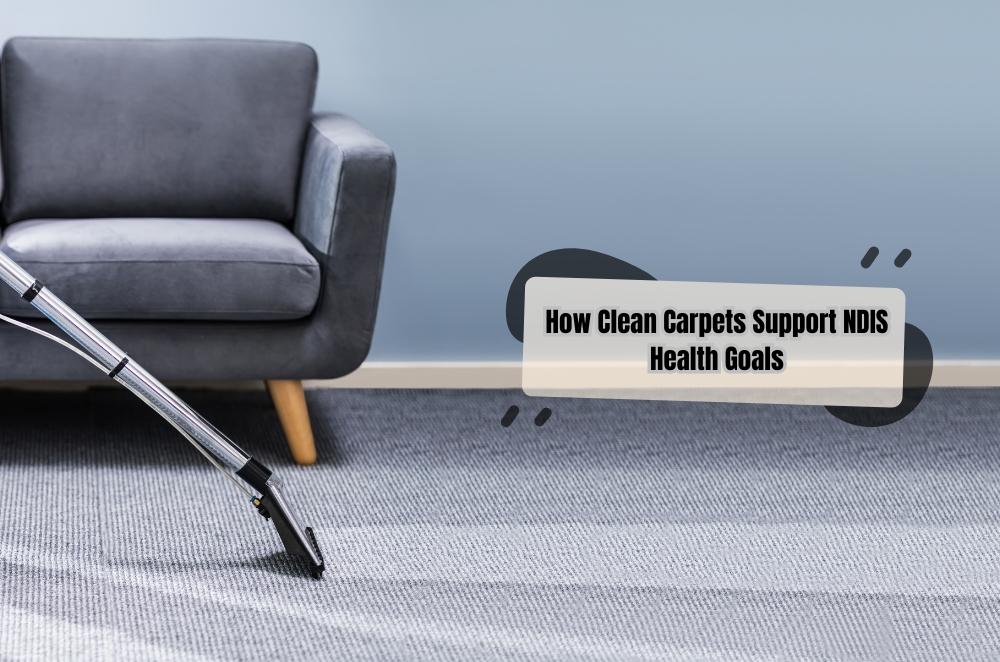Maintaining a safe, hygienic home environment is a critical part of achieving health outcomes under the NDIS. While tasks like personal care or transport often get the spotlight, the state of a participant’s home — particularly flooring — plays a major role in daily wellbeing. That’s where NDIS urgent carpet cleaning becomes more than just a cleaning task; it’s a form of essential support.
From respiratory health to infection control, clean carpets aren’t just about appearance — they’re a health intervention in disguise. Let's unpack why carpet hygiene matters so much under the NDIS and how participants, carers, and providers can all benefit from more intentional flooring care.
Why carpet hygiene matters more than most think
For many NDIS participants — particularly those with respiratory issues, mobility challenges or sensory sensitivities — dirty carpets can become silent health hazards.
Think about it: carpets trap allergens, dust mites, bacteria, and even mould spores. Over time, without regular deep cleaning, this creates an environment where infections thrive and indoor air quality plummets. This is especially risky for participants with compromised immunity or asthma.
In one case, a participant I supported who used a wheelchair experienced persistent skin infections. Turned out, the carpet in his living space hadn’t been professionally cleaned in years. After an urgent deep clean, there was a noticeable improvement in his symptoms and comfort. That moment completely reframed how I saw domestic support under the NDIS.
The role of providers in proactive hygiene planning
Too often, cleaning support is treated reactively — only offered after a visible mess or odour prompts it. But proactive hygiene, especially for flooring, should be integrated into NDIS support plans.
Here’s where support coordinators and plan managers can step in. By assessing the functional health risks associated with unclean environments, they can help justify funding for regular or even urgent carpet cleans as reasonable and necessary.
Some ways providers can integrate carpet hygiene into support plans:
-
Include carpet cleaning in the household task line items
-
Educate families and support workers on hygiene cycles
-
Use quotes and reports from certified cleaners to justify the budget
-
Schedule seasonal cleanings proactively, not reactively
When carpet cleaning is NDIS funded
A common question is: “Can carpet cleaning actually be covered by the NDIS?” The answer? It depends — but often, yes.
Under the NDIS Act, funding must meet the “reasonable and necessary” criteria. If a participant's disability makes them unable to clean effectively themselves — or if the condition of their carpet poses a risk to their health or daily functioning — support for cleaning can be justified.
For instance, if an NDIS participant is living with environmental allergies, help for people with disability may include access to household services that reduce those triggers. The key is documenting the health impacts of unclean carpets and providing professional evidence to support the claim.
Signs you may need an urgent carpet clean
It’s not always obvious when a carpet has crossed the line from "lived in" to "a risk." Here are some red flags support workers and families should watch for:
-
Musty or damp smells (possible mould)
-
Visible stains or high-traffic dirt paths
-
Complaints of sneezing, rashes or irritation
-
Participants are avoiding certain rooms.
-
Pets or spills not cleaned properly
Even in homes that look neat, underlying hygiene issues can persist. That’s why it's worth training carers to notice these subtle cues and escalate the problem.
Tips for maintaining carpet hygiene between cleans
While professional steam cleaning is critical, day-to-day maintenance also plays a role. Especially for participants with limited mobility, easy strategies can help reduce the buildup between visits.
Here are a few low-effort tips that can make a difference:
-
Use doormats and encourage shoe removal
-
Vacuum high-traffic areas twice weekly
-
Spot-clean spills immediately with safe, non-toxic agents
-
Invest in small HEPA-filtered vacuums that carers can operate.
-
Rotate furniture to distribute wear and dust
Rethinking hygiene support under the NDIS
There’s an emerging push in the sector to view home cleanliness not just as a domestic chore, but as a core health service. And rightly so.
Clean environments directly impact participants’ ability to:
-
Sleep better
-
Avoid infection or flare-ups
-
Feel calm and in control
-
Interact with others more confidently
-
Stay in their homes longer without additional support
This holistic approach is backed by advocates who argue that carpet hygiene plays a subtle but powerful role in delivering dignity and choice to NDIS participants.
If you're looking for more context, NDIS carpet hygiene benefits offers a deeper dive into how flooring care intersects with outcomes like independence and safety.
Final thoughts: When in doubt, clean it out
Too often, we underestimate the health consequences of what lies underfoot. But in the world of disability support, every environmental factor — including carpets — matters.
If you're a carer, coordinator, or family member wondering whether it’s time to book a clean, err on the side of action. The cost of inaction, when it comes to participant health and dignity, is always higher.
And if urgency is a factor — maybe there’s a spill, a flare-up, or an inspection on the horizon — make sure you're reaching out to providers who understand the NDIS system inside and out.
Clean carpets aren’t a luxury. For many NDIS participants, they’re a necessity.



